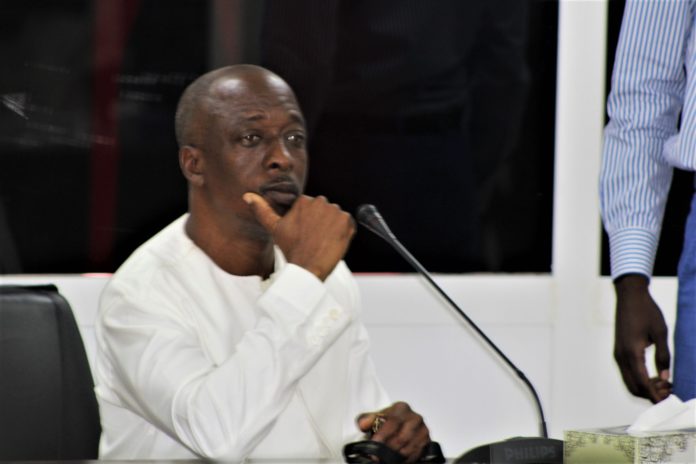By Yankuba Jallow
Justice Ebrima Jaiteh of the High Court has refused the suggestion of the Attorney-General to stay the murder trial of Yankuba Touray while the matter is being referred to the Supreme Court for interpretation of the immunity claim Touray has made.
The accused is charged with murder and he pleaded constitutional immunity without making reference to any section or provision of the 1997 Constitution.
It was the submission of the Hon. Attorney-General that the accused person’s refusal to take his plea and claiming constitutional immunity is a challenge to the jurisdiction of the court to hear and determine this charge of murder. The Hon. Attorney General argued that the accused person’s claim of constitutional immunity is ambiguous and too broad to address its specificity, as there is no provision of the constitution the accused sought to invoke. The Hon. Attorney General further submitted that it is unknown to the Court what type or category of immunity the accused is claiming and argued that the accused cannot arrogate to himself the power to determine his immunity because immunity could only be a defence like other defences in a criminal trial. The Hon. Attorney General submitted that if the court is minded to consider the accused claim of constitutional immunity as a challenge to the jurisdiction of the court, this Hon. Court might refer to section 127 of the constitution for a referral to the Supreme Court for interpretation.
The honourable judge said it is unclear to the Court what sort of immunity the accused person is claiming and the court cannot speculate or conjecture as to what sort of immunity he claims and under which section or provision of the Constitution of The Gambia.
“I therefore ask myself which question or provision of the law would be referred to the Supreme Court for interpretation. I must emphatically state that there is no question of law or provision of the constitution placed before this Court to be referred to the Supreme Court of The Gambia. In my view the accused person by merely stating to the Court that he claims constitutional immunity is not sufficient in law to warrant this Honourable Court to make a referral to the Supreme Court of The Gambia,” Justice Jaiteh ruled.
He said he holds a strong view that if the Accused is interested in raising constitutional immunity, he must come formally before the court or has the liberty to file an originating suit to the Supreme Court directly for interpretation. He said from a perusal of the bill of indictment, the Accused is charged with murder and the court has jurisdiction to hear and determine murder cases.
“The Accused person clumsily claiming constitutional immunity without fulfilling the requirements under the law does not automatically oust this Honourable Court of its jurisdiction to hear and determine the case. From the foregoing reasons, there is absolutely no law or provision of the Constitution placed before this Court to refer to the Supreme Court of The Gambia for interpretation and this I shall hold as a fact. Based on the facts placed before this Hon. Court, this Honourable Court shall not make a referral of this case to the Supreme Court of The Gambia for interpretation or enforcement at this material time,” the trial judge held.
Meanwhile, the court adjourned the matter till 14th October 2019 at 10 am for hearing of PW1 in evidence. This came about after the Attorney-General pleaded to the court to grant them an adjournment till after the forthcoming courts’ vacation.
The Hon. Attorney General in his submission submitted that the prosecution is in the process of amending the bill of indictment to add at least 10 additional counts of murder and other serious offences of high magnitude.
“I must state that the prosecution has the discretion to file additional charges against the accused person at any material time. It is important to note that today is the 15th day of July 2019 and there is 16 days ahead before the commencement of this year’s summer recess, which commences on the 1st day of August 2019. This Honourable Court shall not preside over this matter in the summer recess and considering that the accused was arraigned on the 8th day of July 2019, I do not believe that an adjournment of this matter would occasion a delay in the proceedings and thus denying the accused person a fair trial within a reasonable time because this Honourable Court shall not sit over this matter during the summer recess,” the trial Judge held.
Considering that this is a fresh criminal cause pending before this Honourable Court, Justice Jaiteh said the prosecution must serve the accused person with all relevant information they wish to rely on in this trial with a strong view that the accused person herein shall be accorded adequate time and facility for the preparation of his defence in this trial as provided in section 24(3)(c) of the 1997 Constitution of The Gambia.
He said in the exercise of its discretion to grant an adjournment and considering the prevailing circumstances into account, this Court must not lose sight of its constitutional duty to give all the parties before it a fair hearing, an opportunity to present their respective cases without let or hindrance.
“In balancing the discretionary power to grant an adjournment and in the interest of substantial justice in the shape of this trial and fair hearing, I shall use the discretion of this Court and have this matter adjourn to next term. The prosecution is hereby directed to line up their witnesses for an accelerated trial in this criminal case,” the judge ruled.


















